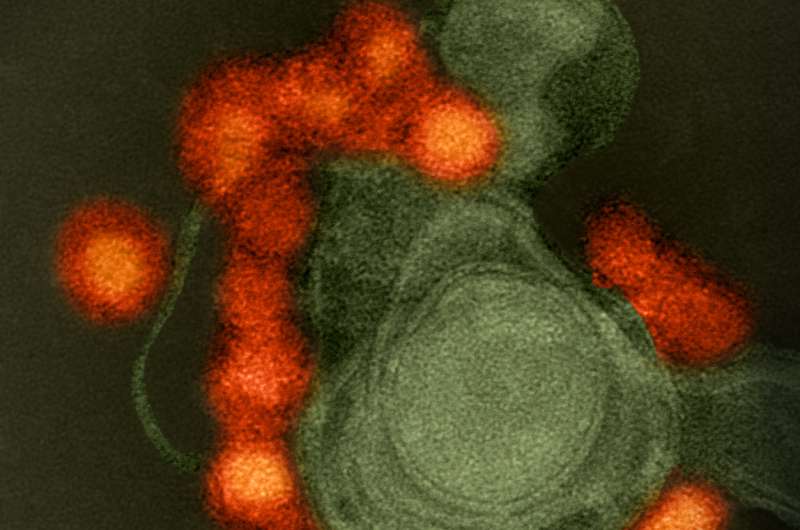Transmission electron microscope image of negative-stained, Fortaleza-strain Zika virus (red), isolated from a microcephaly case in Brazil. The virus is associated with cellular membranes in the center. Credit: NIAID
An examination of cases of Guillain-Barré syndrome in Puerto Rico identified Zika virus infection as a risk factor, according to a study published by JAMA.
Guillain-Barré syndrome (GBS) is an uncommon autoimmune disorder characterized by progressive weakness and diminished deep tendon reflexes following infection or, rarely, vaccination. Increased GBS incidence has been reported in countries affected by Zika virus. Emilio Dirlikov, Ph.D., of the Centers for Disease Control and Prevention, San Juan, Puerto Rico, and colleagues examined risk factors associated with GBS during the Zika virus epidemic in Puerto Rico.
The study included 39 patients with a confirmed GBS neurologic diagnosis. Comparing case-patients and controls, identified GBS risk factors were acute illness within the previous 2 months (82 percent for case-patients vs 22 percent for controls), including multiple symptoms; acute Zika virus infection (23 percent case-patients vs 4 percent controls); and any laboratory evidence of Zika virus infection (69 percent case-patients vs 24 percent controls). No other behaviors, exposures, or medical history variables were identified as risk factors.
A limitation of the study was its small sample size.
"The pathophysiology of Zika virus infection and risk factors for developing GBS require further investigation. Clinical trials of the Zika virus vaccine should monitor for GBS. During Zika virus outbreaks, clinical suspicion should be elevated to improve GBS patient prognosis through prompt diagnosis and treatment," the authors write.
More information: JAMA (2017). DOI: 10.1001/jama.2017.11483
Journal information: Journal of the American Medical Association
Provided by The JAMA Network Journals




















